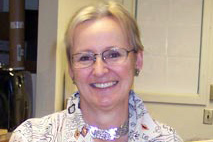Preservationist Helping Save Islamic Texts in Nigeria

Michaelle Biddle, head of preservation services, has returned from a five-week sabbatical to Nigeria, where she conducted a survey of Islamic manuscripts and related materials in northern Nigeria under the auspices of the Arewa House, Centre for Historical Documentation and Research, Ahmadu Bello University.
Biddle was there working on preserving documents and taught conservation workshops to preserve documents in Kaduna, Kano, Sokoto and Maiduguri and teach archivists and conservationists how to best preserve paper documents in accordance with international conservation standards. The program Biddle taught was entitled “Conservation in a Box” and was funded by the U.S. Ambassador’s Cultural Preservation Program.
Each participant received a complete set of conservation tools, conservation supplies that will last many months and a custom-made table on which to work.
Biddle said that working in a multi-lingual environment provided challenges, but they were not insurmountable since English is widely used in education in Nigeria and it is the official language of the country.
“Conservation has a specialized vocabulary and the workshop participants were extremely supportive of each other, translating into Hausa or even Arabic for those who were having difficulty understanding finer points,” Biddle says.
Biddle said that her students told her that they learned as much about critical thinking as how to preserve and conserve these Islamic manuscripts. It was surprising to her that only one student had taken chemistry and no students had taken geometry, even though all of the students were university graduates and many had advanced degrees.
“Both are fundamental in conservation,” Biddle says. “I had not planned on explaining the pH scale or an isosceles triangle.”
She felt that it was rewarding to watch their successes.
“Conservation, the means by which we preserve our heritage, is a commitment not to the past but to the future.”
Biddle’s work in Nigeria was previously featured in the Wesleyan Connection at: http://www.wesleyan.edu/newsletter/campus/2008/0208nigeria.html.

